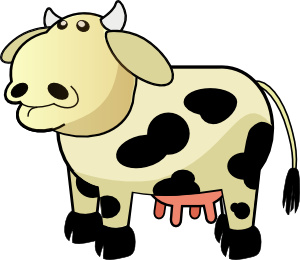Kate Rauner's Blog, page 85
May 30, 2015
Is #ScienceFiction Lazy?
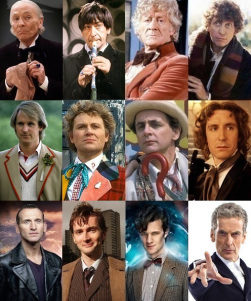
Which Doctor would you want to pluck you effortlessly from your humdrum life?
Science fiction may be the laziest genre because it revels in easy solutions: Why walk if you can warp?
Science fiction often hand-waves away obstacles that are insurmountable or inconvenient. As an author, I’m not going to work out real solutions to every problem – a colony on Mars (a story I’m working on) recycles all its wastes, but I won’t design the water treatment system. (Though, now that I think about it, space toilets can be fun.)
There may never be a Star Trek Enterprise or even a quick hop to another star, and nothing suggests it’s possible to flit through time and space like Doctor Who’s TARDIS. Stories have different levels of reality – at least the Enterprise crew has an employer, but how does the Doctor stock his wardrobe room, or the kitchen for that matter?
In slate.com Jacob Brogan says “Luke [Skywalker] is a slacker, and when he looks to the heavens, he imagines release from the obligations that bind him to the surface of Tatooine… Technology in such stories typically has more to do with workarounds than it does with work.”
Brogan finds that heroes not only escape the real world, they have an easy time becoming “super.”
“In The Matrix, Neo effortlessly learns a host of new skills that would normally take years to develop – the ultimate slacker fantasy.” Harry Potter may have homework, but Hogwarts only teaches those born with magic. (If you’re thinking Harry Potter’s not science fiction, forgive me, but science fiction and fantasy often blur together.)
Science fiction is a huge genre and not all heroes have it so easy. Some characters struggle and there are both happy and tragic endings.
Science fiction sometimes deals with inconvenience – you’ll find generational ships schlepping between stars and space station janitors. But there will also be fantastic elements you have to simply accept – sometimes technical (space war) and sometimes social (raising clones for spare organs). But that’s part of the fun. I’m already living in the real world. I want to read about something amazing and maybe imagine being part of it. That’s why it’s called fiction.








Is Science Fiction Lazy?

Which Doctor would you want to pluck you effortlessly from your humdrum life?
#sciencefiction may be the laziest genre because it revels in easy solutions: Why walk if you can warp?
Science fiction often hand-waves away obstacles that are insurmountable or inconvenient. As an author, I’m not going to work out real solutions to every problem – a colony on Mars (a story I’m working on) recycles all its wastes, but I won’t design the water treatment system. (Though, now that I think about it, space toilets can be fun.)
There may never be a Star Trek Enterprise or even a quick hop to another star, and nothing suggests it’s possible to flit through time and space like Doctor Who’s TARDIS. Stories have different levels of reality – at least the Enterprise crew has an employer, but how does the Doctor stock his wardrobe room, or the kitchen for that matter?
In slate.com Jacob Brogan says “Luke [Skywalker] is a slacker, and when he looks to the heavens, he imagines release from the obligations that bind him to the surface of Tatooine… Technology in such stories typically has more to do with workarounds than it does with work.”
Brogan finds that heroes not only escape the real world, they have an easy time becoming “super.”
“In The Matrix, Neo effortlessly learns a host of new skills that would normally take years to develop – the ultimate slacker fantasy.” Harry Potter may have homework, but Hogwarts only teaches those born with magic. (If you’re thinking Harry Potter’s not science fiction, forgive me, but science fiction and fantasy often blur together.)
Science fiction is a huge genre and not all heroes have it so easy. Some characters struggle and there are both happy and tragic endings.
Science fiction sometimes deals with inconvenience – you’ll find generational ships schlepping between stars and space station janitors. But there will also be fantastic elements you have to simply accept – sometimes technical (space war) and sometimes social (raising clones for spare organs). But that’s part of the fun. I’m already living in the real world. I want to read about something amazing and maybe imagine being part of it. That’s why it’s called fiction.








May 27, 2015
Humanity Belongs to the Dogs – a poem by Kate Rauner
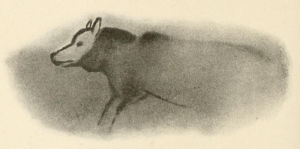
cave painting of a wolf or dog
Humans drop a trail of trash,
Of garbage most enticing.
Wolves followed us across the plains
And with us have been thriving.
Neanderthals all disappeared
When modern humans came.
But wolves survived the journey
And slowly became tame.
Pushed by selective pressure
To tolerate us near,
Some mommas with their litters
Overcame their fears.
Floppy ears and painted coats
And puppies sweet and dear,
Raise alarms with bark and bite
When predators come near.
And so they morphed from pest to pal
Built on returning trust,
Till not a village lacked a dog
Domesticating us.
iflscience reported findings, published in Current Biology this week, that suggest dogs became domesticated thousands of years earlier than previously thought. They may have been our companions for 30,000 years.
That reminds me of what I’ve learned about the origin of the dog and of how experiments breeding foxes for friendliness yield dog-like offspring in surprisingly few generations. We once thought humans domesticated the dog by capturing and raising wolf pups, but it seems more likely they domesticated themselves by moving from our dumps to our firesides to our homes.
Individuals that tolerated us were safer and better fed, and bred more successfully. They rapidly evolved into dogs and followed us around the world. Our partnership is so successful it’s hard to imagine a town or tribe without dogs. I wonder how different we would be today if dogs had never found us. #dog #wolf #evolution #puppy








May 23, 2015
Warm Blooded Fish – Will Wonders Never Cease?
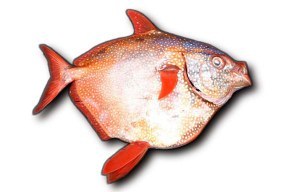 The opah or moon fish – name like a children’s rhyme and looks like a speckled orange Frisbee – does something I never thought possible.
The opah or moon fish – name like a children’s rhyme and looks like a speckled orange Frisbee – does something I never thought possible.
“The opah… can consistently keep its entire body around 5 degrees Celsius warmer than its environment. It doesn’t burn as hot as a bird or mammal, but it certainly outperforms its other relatives.” The secret is in the blood vessels of its gills.
“Wegner’s team confirmed this by catching opah, implanting them with small thermometers, and then releasing them. The instruments inside the fish recorded consistently higher temperatures than those dropped into the surrounding water. The opah’s brain is warm. Its muscles are warm. And perhaps most importantly, its heart is warm—a first for a fish. Not even a great white shark [which warms some of its muscles] has a warm heart.”
Our human attempts to shove every creature into a neat little category are once again defeated by Nature. The world is so much bigger than we realize. That makes me happy.
Thanks to nationalgeographic.com. Also see wikipedia.








May 20, 2015
Deep Sea Cousins – a poem by Kate Rauner
Prokaryote,
A mass of gel.
Eukaryote
Has organelles.
There lives a form
Deep in the seas
That shares some genes
With both of these.
Say scientists who made the find
“We thought this really weird.”
In analyzing DNA
Surprising genes appeared.
Just as across the eons had,
Existing down below,
Dividing once per decade,
Exceedingly slow.
In the dark and in the cold
Peaceful lives unplanned
Paid no notice to their kin
That floated up to land.
Sorting their relationships
Thanks to discovery
Along with fungus, plants, and us
Twigs on our family tree.
A team of biologists, co-led by Dr Lionel Guy and Dr Thijs J. G. Ettema from Uppsala University in Sweden, has discovered a new group of microorganisms that represents an intermediate form in-between the simple cells of bacteria and the complex cell types of eukaryotes.
“This is an organism living today is a descendent of the last common ancestor perhaps – but is has retained characteristics of the last common ancestor.”
Researchers have debated whether eukaryotes—the group of relatively complex organisms that includes fungi, plants, and animals—are descendants of archaea or merely their close relatives. Newly discovered archaea from the bottom of the North Atlantic Ocean suggest that eukaryotes evolved from archaea. A genomic analysis of one of the organisms, called Loki, reveals that it is the most eukaryotelike prokaryote so far discovered. The study suggests that the ancestor of eukaroytes might have had an actin cytoskeleton and rudimentary internal structures composed of membranes.








May 16, 2015
Not Our Pizza Boxes
 The last bakery pastry you bought may have been killing you, and not because of all that butter and sugar. The waxy wrapper it came in isn’t coated in wax at all. It’s probably coated in PFAS, which also keeps oil from soaking through your pizza box.
The last bakery pastry you bought may have been killing you, and not because of all that butter and sugar. The waxy wrapper it came in isn’t coated in wax at all. It’s probably coated in PFAS, which also keeps oil from soaking through your pizza box.
“A previous type of PFAS, popularized by DuPont years ago in Teflon products, is no longer in use because of concerns the chemicals lingered in bodies and raised the risk of cancer. In today’s warning letter, scientists warn that the replacement PFASs need far more study to make sure they’re safe.” usatoday.com
The chemical industry (DuPont in particular) says that the chemicals are safe. I’m willing to take some risks, just as long as companies tell the truth as soon as they learn it. While Big Tobacco does not lead me to optimism on this score, who wants pizza oil soaking through to the car seat on the drive home? Hey, I don’t eat the box!
Long ago someone told me that morally wrong decisions never work out right, so you might as well be honest upfront. That thought has comforted me at times in my life when I’ve had t admit I screwed up. I hope companies learn the same lesson. But if they don’t, I hope our regulators are up to the job. Evidence-based, please, not emotional conspiracy theories. After all, I can only read part of the news. And I don’t want pizza oil soaking through to my car seat…
(BTW – WordPress inexplicably sequenced this new post way down on the page, so I’m reposting it at the top – sorry if you see it twice. Kate)








May 13, 2015
Red Trees – a poem by Kate Rauner
Red trees,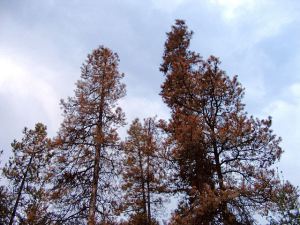
Dead trees,
Burned by drought
To tinder.
Needles brown,
Dropping down,
Incendiary
Die-off.
Millions more
Before fall
Will die
In western lands.
Defensive sap
Can’t entrap
Beetles
In their bark.
Fifty years
Since such tears
For forest loss
That stretches on.
Red trees
Are dead trees,
Parched and dried,
Until they died.
I was struck by the term “red trees” to describe newly dead pines. California is not the only American state suffering drought. Trees die, grasslands burn, and the face of the land changes. Drought is part of natural cycles in “the Great American Desert,” but global warming is expected to exacerbate the current conditions.








May 9, 2015
Animal Rights, Animal Welfare
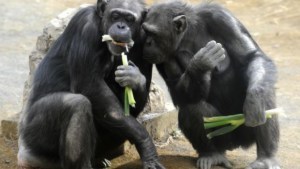 This post is about philosophy rather than science. While I love science because it allows us to learn about the world, and I believe policies should be based on reality, science can’t replace ethics.
This post is about philosophy rather than science. While I love science because it allows us to learn about the world, and I believe policies should be based on reality, science can’t replace ethics.
I recently ran across the Nonhuman Rights Project, which is in the news for a court case to force the release of two chimpanzees used for research by granting them the legal status of “persons.”
Before you assume the chimps’ lawyers are nuts and want apes to join the United Nations, take a look at this description from their website:
“Do not confuse these fundamental rights of nonhuman animals with so-called ‘human rights.’ Human rights are for humans. Chimpanzee rights are for chimpanzees. Dolphin rights are for dolphins. Elephant rights are for elephants.”
What these rights entail is “not being held in captivity” and “not being touched without consent or in one���s best interests,” which refers to medical research and forced performances. The group says they advocate for “animals for whom there is clear scientific evidence of such complex cognitive abilities as self-awareness and autonomy. Currently that evidence exists for elephants, dolphins and whales, and all four species of great apes.”
While I realize some medical breakthroughs depend on animal  research, it does leave me queasy. I’m reminded of Christiaan Barnard, the heart transplant pioneer, who stopped using chimps in his work because he couldn’t bear their suffering. One of my favorite childhood books was Beautiful Joe (I’m pleased to see it’s still available), an 1893 book that was part of that era’s fight against cruelty to animals that lives on in the Humane Society and countless laws and ordinances. You only have to imagine the reaction if someone started beating a dog in a public park to realize our society has profoundly changed its views on animals. Today we see animal abuse as a sign of pathology, of a sick mind and soul.
research, it does leave me queasy. I’m reminded of Christiaan Barnard, the heart transplant pioneer, who stopped using chimps in his work because he couldn’t bear their suffering. One of my favorite childhood books was Beautiful Joe (I’m pleased to see it’s still available), an 1893 book that was part of that era’s fight against cruelty to animals that lives on in the Humane Society and countless laws and ordinances. You only have to imagine the reaction if someone started beating a dog in a public park to realize our society has profoundly changed its views on animals. Today we see animal abuse as a sign of pathology, of a sick mind and soul.
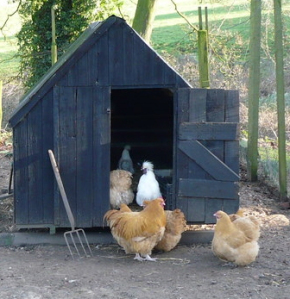
by Phil Catterall
Science can help us understand animals, but it can’t tell us how we should treat them. The Nonhuman Rights Project focuses on sentient animals, but animal rights are a larger concern. I eat meat, and I’m willing to pay more at the grocery store for animals to be treated humanely – I think. I still bypass the free-range chicken for cheaper packages – I tell myself I don’t trust the labeling to reflect better lives for chickens. I’ve been to SeaWorld despite controversy. I keep pets. I wonder if, in another hundred years, I’ll be viewed as a barbarian.








May 6, 2015
Grass Fed – a poem by Kate Rauner
Human beings are grazers,
We feed on grass supreme,
On rice and wheat and maize,
What we harvest and we glean.
Some grass is processed through a cow,
Grazing once removed.
Add sugarcane for sweetness,
Grass is our favorite food.
We think we’re mighty hunters,
Our prowess makes us proud.
But really we are grazers,
A kin to humble cows.
To feed nine billion people well by the mid 21st century, we need to grow more and better grass than ever before. One scientist sees the range of tools from genetic engineering to organic farming as a continuum, not a conflict. Of course, it helps if she can find superior genes in one variety of rice to place in another variety of rice. If golden rice had been the first GMO popularly reported, instead of Roundup resistant soybeans (You can spray more herbicides on my food than before? Great) I think GMOs would be embraced. No one seems to object to GMOs that produce medicine. I’m open to cross-species crop genetics. We are, after all, all brothers.








May 3, 2015
Not Our Pizza Boxes
 The last bakery pastry you bought may have been killing you, and not because of all that butter and sugar. The waxy wrapper it came in isn’t coated in wax at all. It’s probably coated in PFAS, which also keeps oil from soaking through your pizza box.
The last bakery pastry you bought may have been killing you, and not because of all that butter and sugar. The waxy wrapper it came in isn’t coated in wax at all. It’s probably coated in PFAS, which also keeps oil from soaking through your pizza box.
“A previous type of PFAS, popularized by DuPont years ago in Teflon products, is no longer in use because of concerns the chemicals lingered in bodies and raised the risk of cancer. In today’s warning letter, scientists warn that the replacement PFASs need far more study to make sure they’re safe.” usatoday.com
The chemical industry (DuPont in particular) says that the chemicals are safe. I’m willing to take some risks, just as long as companies tell the truth as soon as they learn it. While Big Tobacco does not lead me to optimism on this score, who wants pizza oil soaking through to the car seat on the drive home? Hey, I don’t eat the box!
Long ago someone told me that morally wrong decisions never work out right, so you might as well be honest upfront. That thought has comforted me at times in my life when I’ve had t admit I screwed up. I hope companies learn the same lesson. But if they don’t, I hope our regulators are up to the job. Evidence-based, please, not emotional conspiracy theories. After all, I can only read part of the news. And I don’t want pizza oil soaking through to my car seat…









